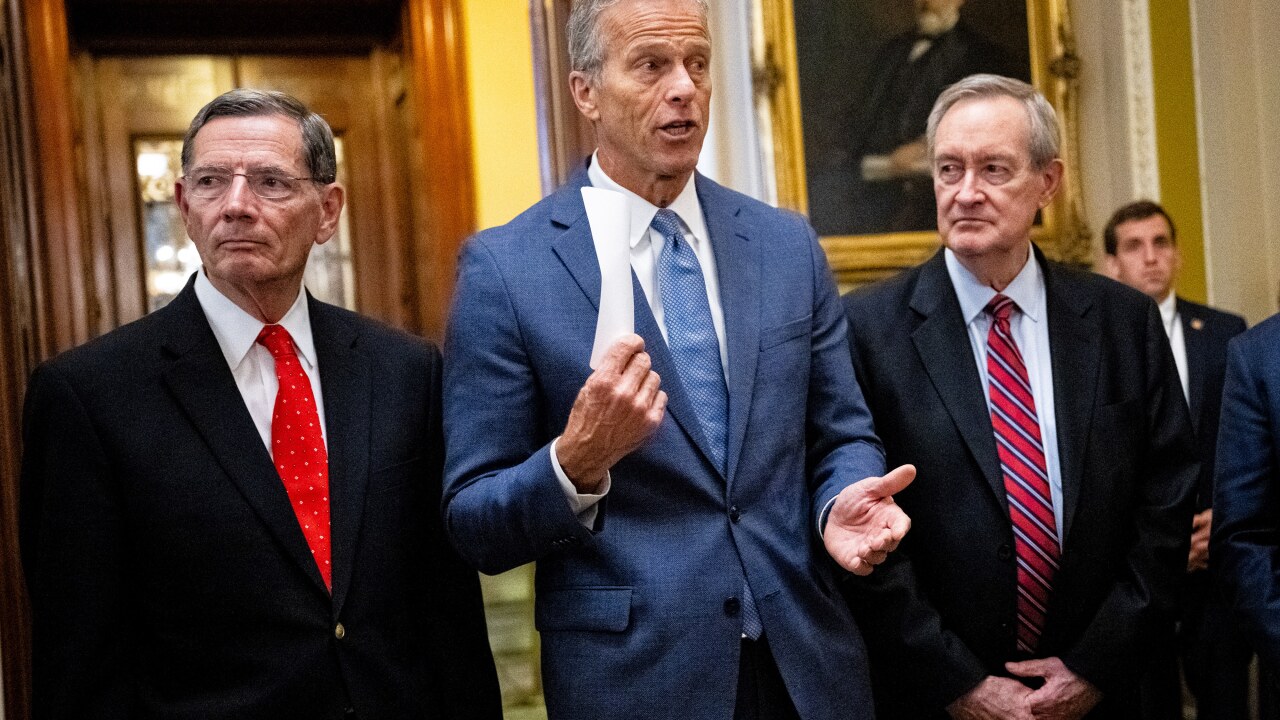-
House Republicans are expected to once again push for repeal of the FDIC's orderly liquidation authority outlined in the Dodd-Frank law as they fight over President Obama's budget.
February 8
WASHINGTON — Rep. Paul Ryan's fiscal 2014 budget plan, released by the House Budget Committee on Tuesday, renewed attacks on the Dodd-Frank reform law, including its provisions for winding down large, failing firms.
The Wisconsin Republican's plan, which would slash $5.7 trillion in total spending and balance the budget in 10 years, is widely expected to pass the Republican-controlled House, but will not have much life beyond that due to strident opposition from Senate Democrats and the White House.
The Senate Budget Committee is expected to start deliberating on its own budget blueprint on Wednesday. That plan would cut the deficit by $1.85 trillion over the next decade, funded by a 50-50 mix of spending cuts and tax increases, according to press reports.
President Obama, meanwhile, is slated to announce his budget the week of April 8, according to press reports. Obama was mandated by law to release his budget by Feb. 4, but the White House said it has been delayed by the fiscal cliff negotiations that took place at the end of last year.
The House latest plan's lack of fresh approaches disappointed some observers, and suggests many of the same old financial services battles will continue to be fought on Capitol Hill for the foreseeable future.
"After reviewing the GOP budget proposal it became readily apparent that much of the document was a rehashing of earlier proposals, especially for financial services issues. In fact, some elements of the proposals were literally copied verbatim from Rep. Ryan's 2012 budget proposal," said Isaac Boltansky, a policy analyst at Compass Point Research & Trading. "The renewed calls to terminate the orderly liquidation authority granted by the Dodd-Frank Act and to wind down the GSEs will evoke the exact same reactions they did in 2012 — loud cheers in the House and crickets in the Senate."
Senate Majority Leader Harry Reid, D-Nev., quipped that the plan was "déjà vu all over again," citing Yogi Berra on the chamber floor.
Ryan's budget recommends removing title II of the Dodd-Frank law, which establishes the Federal Deposit Insurance Corporation's authority to wind down large institutions, citing a long-disputed Congressional Budget Office estimate that the program will cost taxpayers $33 billion over the next decade. Critics argue the estimate is flawed because the provision requires the industry to pay back any costs over the long term, and because there would be no costs unless a major institution fails and regulators need to act.
"While the authors of the Dodd-Frank Act went to great lengths to denounce bailouts, this law only sustains them. The Federal Deposit Insurance Corporation now has the authority to draw on taxpayer dollars to bail out the creditors of large, ‘systemically significant" financial institutions," according to Ryan's plan. "CBO's expected cost for this new authority is $33 billion, although the office recognizes that ‘the cost of the program will depend on future economic and financial events that are inherently unpredictable.' In other words, another large-scale financial crisis in which creditors are guaranteed to get government bailouts would cost taxpayers much, much more."
The plan also reiterates calls for the winding down of government-sponsored enterprises Fannie Mae and Freddie Mac, and requests that the government start using fair-value scoring to boost risk-taking behavior at the Federal Housing Administration.
"Despite the government's abysmal track record of interference in the housing market, Fannie, Freddie, and another government housing agency, the Federal Housing Administration, now dominate 99% of the market for the issuance of new mortgage-backed securities," says the budget plan. "Corporate-welfare arrangements like the GSEs socialize risk by shifting losses to the taxpayers, but allow profits to accrue to management, bondholders, and Wall Street institutions that trade mortgage-backed securities. On their current course, the GSEs represent a failed experiment in corporate welfare and the largest bailout of financial institutions in recent history."
The plan instructs each of eight committees, including the House Financial Services Committee, to craft legislation reducing the deficit by at least $1 billion. Responding to a similar request last year, the banking panel





